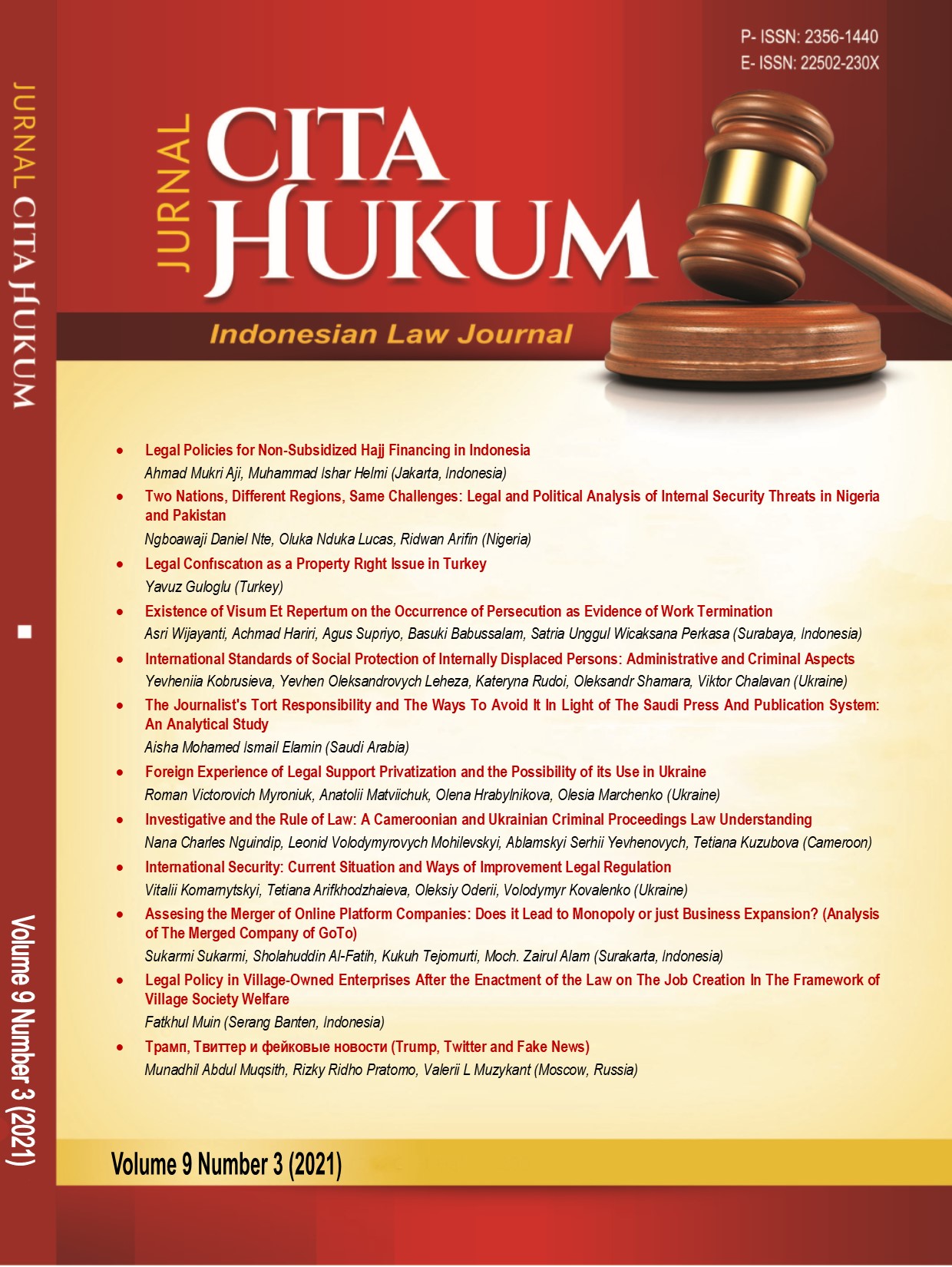A Comparative Legal Analysis of Freedom of Belief and Worship in Turkey
DOI:
https://doi.org/10.15408/jch.v12i3.43849Keywords:
Belief, Worship, Secularism, Sharia, FreedomAbstract
Freedom of Belief and Freedom of Worship are interrelated and complementary freedoms. While belief primarily concerns the internal aspect of an individual, their spirit and worship can be seen as the manifestation of belief, transitioning from the abstract to the tangible. Freedom of belief and worship are among the inalienable fundamental rights established in national, regional, and international human rights documents. Recognised as one of the core values of a democratic society, freedom of belief is considered a fundamental right that cannot be restricted, even in times of war or emergency. The scope of these rights and freedoms, as enshrined in the constitutions of modern societies, has expanded over time in favour of liberties through legislative regulations and judicial rulings. Generally, in the decisions of the Turkish Constitutional Court and the European Court of Human Rights, to which Turkey is a party, it is emphasised that the internal aspect of freedom of belief is an inseparable part of one’s personality, making this freedom non-restrictable. However, it is difficult to assert that freedom of worship, which serves as an outward expression of this liberty, is fully guaranteed by the legal system, as it is acknowledged that this freedom can be restricted in line with the requirements of a democratic society. Given that the boundaries of freedom of belief and worship cannot be distinctly defined and that separating these two domains is highly complex, it must be recognised that any intervention or limitation on freedom of worship inevitably impacts freedom of belief. This study will examine international legal regulations on freedom of belief and worship, constitutional provisions, and the decisions of the European Court of Human Rights and the Constitutional Court on this matter. Additionally, progress made in Turkey, along with challenges and shortcomings encountered in practice, will be addressed, and potential solutions will be offered. The topic will also be compared from a religious perspective, assessing the role of religion concerning these freedoms.
References
Ansay, S. Ş. (2002). Islamic Law in Legal History (4th Edition). Ankara: Turhan Publishing House.
Ateş, A. (2002). The Problem of Coercion and Violence in Religion, İstanbul, AYM, E. 1989/1, K. 1989/12, KT. 07.03.1989; E. 1990/36, K. 1991/8, KT. 09.04.1991; E.2008/16, K. 2008/116, KT. 05.06.2008.
Bilmen, Ö. N. (1985). Legal Islam and Istilahati Fikhiyye Public. Bilmen Publishing House, Istanbul.
Borovalı, M., & Boyraz, C. (2016). Cemevi Problem In Turkey: Rights And Freedoms
A Critical Approach In Context. Mulkiye Magazine, 40(3), 55-86.
Buhârî, M. (1992). el-Câmiʿu’s-sahîh. nşr. Bedreddin Çetiner. Istanbul: Çağrı Publications.
Cevherî, İ. (2007). es-Sıhâh: Tâcü’l-luga ve sıhâhu’l-‘Arabiyye. nşr. Halîl Me’mûn Şeyhâ. Beyrut: Dârü’l-Ma‘rife.
Cevziyye, İ. (ts.). Kitâbü’s-Salât. thk. Adnân b. Safâhân el-Buhârî. Cidde: Dârü Âlemi’l-Fevâid.
Cürcânî, S. (2003). et-Ta‘rîfât. thk. Muhammed Abdurrahman el-Mer’aşlî. Beyrut: Dârü’n-Nefâes.
Doğru,O., Nalbant, A. (2013). European Convention on Human Rights: Explanation and Important Decisions Volume 2, Ankara: Pozitif Matbaa.
Döndüren, H. (1991). Islamic Catechism with Evidence, Istanbul: Altınoluk Printing House.
Düzenli, P. (2017). “Can Tax Replace Zakat?”. Zakat Practices in History and Today: International Controversial Scientific Meeting, 03-04 December 2016. 635-642. Istanbul: Ensar Neşriyat.
Ekinci, A. (2021). “The Ruling of Those Who Do Not Pray in Islamic Law”. Kocatepe Journal of Islamic Sciences, 4/2 (Aralık), 388-409.
Eren, A. (2004). The 2004 Amendment to Article 90 of the 1982 Constitution Effect on its Place in Domestic Law. Erzincan Binali Yıldırım University Faculty of Law Journal, 8(3-4), 47-77.
ECHR, Sinan Işık/Türkiye, No. 21924/05, 2 February 2010.
ECHR, Osman Murat Ülke/Türkiye, No. 39437/98, 24 April 2006;
ECHR, Feti Demirtaş/Türkiye, No. 5260/07, 17 January 2012;
ECHR, Erçep/Türkiye, No. 5260/07, 22 February 2012;
ECHR, Halil Savda/Türkiye, No. 42730/05, 12 June 2012;
ECHR, Mehmet Tarhan/Türkiye, No. 9078/06, 12 July 2012.
ECHR, Hasan ve Eylem Zengin/Türkiye, No. 1448/04, 9 October 2007
ECHR, Mansur Yalçın ve Others/Türkiye, No. 21163/11, 16 September 2014.
ECHR, 15472/02 (29 June 2007).
ECHR, 44774/98 (10 November 2005).
ECHR,. 23459/03 (7 July 2011).
European Council (2020). Guide to Article 9 of the European Convention on Human Rights Thought, Religion andFreedom of Conscience, https://www.echr.coe.int/Documents/Guide_ Art_9_TUR.pdf.
Fayda, M. (2008). “Ride”. Turkish Religious Foundation Islamic Encyclopedia. 35/91-93. Istanbul: TDV Publications.
Freeman, H. A. (1958), “A Remonstrance for Conscience” , Unniversity of Pennsylvania Law Review, 106, 806-826.
Ferâhîdî, H. (2002). Kitâbü’l-‘Ayn, thk. Abdulhamîd Hendâvî. Beyrut: Dârü’l Kütübi’l-İlmiyye.
Gözler, K. (2017). Human Rights Law. Ekin Publishing, Bursa.
Gözler, K. (2018) Turkish Constitutional Law Lessons, Ekin Publishing House, Bursa.
Göze, A. (1989). Turkish War of Independence and Revolution History. Beta Printing Publishing Distribution.
Harris, D. J., O’Boyle M., Bates, E. P., Buckley, C. M. (2013). European Human Rights Contract Law, Ankara: Şen Press.
İbn Sa‘d, M. (2001). Kitâbü’t-Tabakâti’l-kebîr. thk. Ali Muhammed Umer. Kahire: Mektebetü’l-Hâncî.
İnce, İ. (2008). “Ridde”. Turkish Religious Foundation Islamic Encyclopedia. 35/91-93. Istanbul: TDV Publications.
İsfahânî, R. (ts.). el-Müfredât fî garîbi’l-Kur’ân. nşr. Safvân Adnân Dâvûdî. Beyrut: ed-Dârü’ş-Şâmiyye.
Kaboğlu, İ. Ö. (1991). “Freedom of Religion (Limits and Assurance)”, Ankara University SBF Magazine, 46(1), 265-278.
Kışlalı A.T., (2006) Political Systems, İmge Bookstore, İstanbul. s. 248-250.
Konan, B. (2011). To the Ottoman Empire in Terms of Human Rights and Fundamental.
Freedoms View. Ankara Hacı Bayram Veli University Faculty of Law Journal, 15(4), 253-288)
Köse, S. (2003). Freedom of Religion and Conscience from the Perspective of Islamic Law. Istanbul: İz Publications.
Kurtubî, M. (2006). el-Câmi‘ li-ahkâmi’l-Kur’ân. thk. Abdullah b. Abdulmuhsin vd. Beyrut: Müessesetü’r-Risâle.
Küçük, A. (2009). The Concept of Aversion in the Quran and the Issue of Coercion in Religion. Marife Journal of Religious Studies, 9(2), 25-46.
Limoncuoğlu, S. A. “The Legal Dimension of the Headscarf Problem: Constitutional Change Will Be a Solution “Is it?”, Journal of the Union of Turkish Bar Associations,S.75, Y.2008, s. 138-163.
Matüridi, E. (2007). Te’vîlâtü’l-Kur’an, İstanbul: Mîzân Publication.
Mızrak, D. (2015). “Conscientious Objection to Compulsory Military Service and Civil Disobedience”, TBB Magazine, 116(1), 113-134.
Nevevî, M. (ts.). el-Mecmu‘şerhü’l-Mühezzeb. Beyrut: Dârü’l-Fikr.
Özkul, F. (2014). The Principle of Secularism in Our Constitutions. Ankara Bar Association Journal, (4).
Özbudun, E. ( 2010). Turkish Constitutional Law. Ankara.
Özipek, B. B. (2011). “Freedom of Religion and Conscience: A Constitutional Framework Proposal for Türkiye”, Istanbul Commerce University Journal of Social Sciences, 10(19), 207-219.
Polat, İ. (2023). “Principles of Fundamental Rights and Freedoms in Islam”, Fırat University Journal of The Faculty of Theology, 28/195-211.
Rızâ, R. (1990). Tefsîru’l-Kur’âni’l-Hakîm-Tefsiru’l-Menâr, Kahire: Hey’etü’l-Mısriyye el-Âmme.
Serahsî, Ş. (1993) el-Mebsût. Beyrut: Darü’l-Ma‘rife.
Sülün, M. (2009). “The Conceptual Framework of 'Salat' in the Holy Quran”, Prayer and Mosque in Terms of Social and Individual Functions, Istanbul, Ensar Neşriyat. 17-46.
Süyûtî, M. (ts.). Metâlibü üli’n-nühâ fî şerhi Gâeti’l-müntehâ. Beyrut: el-Mektebetü'l-İslâmî.
Soysal, M. (1986). The Meaning of the Constitution in 100 Questions. Real broadcasts.
Şevkânî, M. (1993). Neylü’l-evtâr şerhu Münteka’l-ahbâr min ehâdîssi seyyidi’l-ahyâr. thk.
Isamüddin es-Sababati. Kahire: Darü’l-Hadis.
Şevkânî, M. (1993). Neylü’l-evtâr şerhu Münteka’l-ahbâr min ehâdîssi seyyidi’l-ahyâr. thk.
Isamüddin es-Sababati. Kahire: Dârü’l-Hadîs.
Şeybânî, M. (2009). en-Nihâye fî garîbi’l-hadîs ve’l-eser. thk. Halîl Me’mûn Şeyhâ. Beyrut: Darü’l-Ma‘rife.
Topaloğlu, B. (1991). “Clothing and Covering in Terms of Islamic Faith”. Dress and Covering in Islam. 13-20. Istanbul: İlmi Neşriyat.
Türkoğlu, B. M. D. (2022). The Inner Dimension of Freedom of Belief. Academic Journal of the Turkish Human Rights and Equality Institution, 5(8), 121-142.
UN Human Rights Committee, Atasoy ve Sarkut/Türkiye, UN Doc CCPR/C/104/D/1853-1854/2008, 19 Haziran 2012.
URL-2, http://www.sonmezkutlu.net/?pnum=93&pt=Alevilik+din+mi+mezhep+mi+tarikat+m%C4%B1
URL-1, https://www.trthaber.com/haber/yasam/turkiye-nufusunun-yuzde-992si-musluman-136243.html
Uğur, H. (2008). The Comparison of The Concepts of "Prayer" in The Old Testament and "Salat" in Quran. Çukurova University Journal of Faculty of Divinity 8 (2), 133-166.
Ugur, H. (2020). Submission of the Torah to the Quran. Topics Confirmed by the Quran in the Torah, Bursa, Emin Publications.
Ünal, İ. (2005). “Religious Liberty in Islam and First Examples”, Journal of Islamic Research, 18(3), 275-293.
Ünal, M. (2019). Freedom of Expression and Insult to Religion in Modern Law and Islamic Law Limitation at Point. Necmettin Erbakan University Faculty of Law Journal, C2(2), 135-158.
Vural, H. (2014). “Freedom of Religion in the Constitution”, Ankara University SBF Magazine, 69(2), 241-278.
Yavuz, Y. V. (1996). “Fitre”. Turkish Religious Foundation Islamic Encyclopedia. 13/160-161. Istanbul: TDV Publications.
Yakıt, İ. (2014). “Freedom of Belief and Thought in the Quran and Sunnah”, Fundamental Human Rights According to the Quran and Sunnah, Istanbul, Ensar Neşriyat. 385-399.
Yıldırım, M. (2022). A Call for Progress from Wish to Action: Religion or Belief in Turkey Freedom Monitoring Report.












